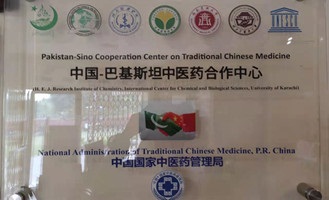BEIJING, Jan. 25 : Sino-Pakistan Cooperation Center on Traditional Chinese Medicine (SPCCTCM) was launched respectively in Hunan University of Medicine in Huaihua China and the University of Karachi.
According to China Economic Net (CEN), the SPCCTCM will further strengthen cooperation between the iron brothers on the Traditional Chinese Medicine (TCM) and benefit the people of the two nations.
It will carry out various cooperation, including the R&D of medicines and healthy and nutritious foods, education, medical treatment, academic and cultural exchange, and industrial cooperation.
As TCM played an irreplaceable role in the fight against COVID-19,China has shared efficient TCM prescriptions and clinical experiences with over 80 countries and regions including Pakistan.
Chinese government and enterprises also donated TCM products to foreign countries, for example, an enterprise from Hunan Province, China has donated medicines to University of Karachi in 2020.
“We hope that SPCCTCM will promote TCM in Pakistan and bring tangible benefits to Pakistanis,” said Wang Qiong, the vice director of SPCCTCM, professor of Institute of Food Science and Technology, Chinese Academy of Agricultural Sciences, who has been engaged in China-Pakistan cooperation and exchanges on TCM for many years.
According to Wang, SPCCTCM will integrate a team of experts in the fields of traditional medicine from China and Pakistan, to carry out R&D of herbal medicines, including cultivation of medicinal plants, botanical identification, phytochemistry, quality control, efficacy and safety evaluation and clinical trial. They will also promote the registration of herbal plants and herbal products in China and Pakistan.
Wang told CEN, long before the launch of SPCCTCM, Liu Xinmin, Co-Director of SPCCTCM, a professor of Institute of Medicinal Plant Development, Chinese Academy of Medical Sciences and a member of Expert Advisory Panel on Traditional Medicine, WHO, had cooperated with Dr. Atta-ur-Rahman, a scientist and the Chairman of the Pakistani PM’s Taskforce on Science and Technology on TCM, and Prof. Iqbal, Director of ICCBS, University of Karachi.
Their cooperation included R&D and academic exchanges. During two decades’ cooperation, they have gradually drawn more and more academic institutes and enterprises to join in, including Hunan University of Traditional Chinese Medicine, Affiliated TCM hospital of Southwest Medical University, Institute of Food Science and Technology, Chinese Academy of Agricultural Sciences, Hamdard University in Pakistan and Pakistani enterprises, etc.
In December 2020, China’s National Administration of Traditional Chinese Medicine (NATCM) approved the establishment of SPCCTCM in Huaihua, a city with ample resources of TCM.
Dr. Azra Fazal Pechuho, Health Minister of Sindh, who once visited Huaihua in 2019, said the ICCBS of University of Karachi has long-term cooperation with Chinese TCM institutes and pharmaceutical enterprises. The minister believes that the establishment of SPCCTCM will benefit both Chinese and the Pakistani people.
Moin ul Haque, the Pakistani Ambassador to China, Pang Chunxue, Minister Counselor of the Chinese Embassy in Pakistan and Zhu Haidong, vice Director, the Department of International Cooperation of NATCM, attended the launching ceremony via video link held on Jan. 21 2020.
They hope that the two nations’ scientists will build SPCCTCM into a national level platform of China-Pak cooperation and a model of international cooperation on TCM, and present it as a gift for the 70th anniversary of the establishment of diplomatic ties between China and Pakistan.
So far, TCM has been introduced to 183 countries and regions around the world, and China has signed TCM cooperation agreements with over 40 foreign governments, regional organizations and international organizations.

















